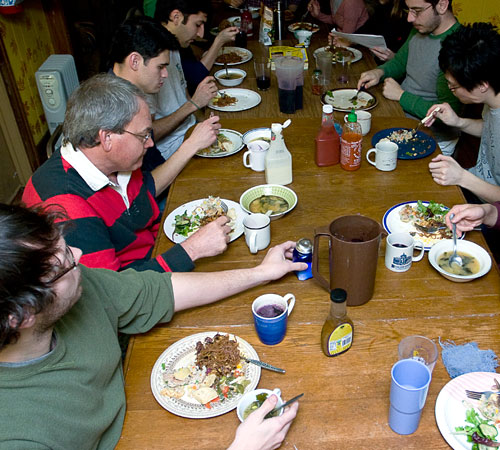Urbana’s Harvest House promotes eco-friendly community lifestyle
February 12, 2009
Composting, collecting rain water and not flushing after urinating may sound like a rather unorthodox way to live. However, at Harvest House, 702 W. Washington St. Urbana, it is a part of daily life.
Harvest House is a cooperative living house on campus that focuses on a vegetarian lifestyle and energy efficiency. It is open not only to undergraduates, but graduate students and non-students as well.
“We average, for a house of 14 (people), half the household water usage and energy usage (than that of) a house of four,” said Stephanie Spees, senior in LAS and Harvest House membership coordinator.
“We’re constantly trying to do things in a way that is as environmentally friendly as possible.”
Harvest House began as a co-op in mid-August 2002. It is one of four co-ops owned by the Community of Urbana-Champaign Cooperative Housing, and is the only one that is strictly vegetarian.
Get The Daily Illini in your inbox!
“Because we can pool our sources, we can buy more expensive stuff like organic (items),” Spees said. “We also buy local product.”
To help save costs, residents buy food in bulk. Most of the bulk items are purchased from United Natural Foods Inc.
“The more we order from (United Natural Foods Inc.), the more discount,” said Robbie Nagel, graduate student in LAS.
Harvest House holds communal meals every evening. Non-residents are allowed to eat there as well, but are asked to chip in for the cost of groceries. Everyone is expected to help cook once a week.
Joey Crawford, 2008 graduate of the University, said this rule has helped him improve his cooking skills.
“I’ve learned that food can be made from scratch,” he said
However, the most important aspect of a co-op is cooperation. Everyone helps out with chores such as cooking and cleaning, even if it is not their own mess.
“You have responsibility for other people,” said Anca Macinca, junior in LAS.
“It forces you to think about what is best for other people and their opinions. It makes you work together.”
Residents at the co-op are also encouraged to confront each other with their problems.
“I’ve gained the ability to express my feelings and thoughts better,” Nagel said. “I have to talk to people about problems.”
Nagel added that while it is accepted in the house, he discovered that confrontation is not as widely received elsewhere.
“They took it a little hard,” Nagel said. “I’m not trying to be mean, I’m only honest.”
Those who have recently moved into Harvest House from another town find that it is one of the best ways to become incorporated into the community.
“I didn’t know that many people,” said Bradley Bergstrand, University of Illinois at Chicago graduate. “I thought it’d be a good community to join. Everyone works together.”
Bergstrand added that once people get out of school, they go back and forth from their jobs and don’t see people.
“Here, you have a community to start with,” he said.
For those who have lived in various housing units, some say they don’t compare to Harvest House.
“I’ve lived in places with a lot of people and no responsibility,” Crawford said. “I’ve lived by myself in an apartment over summer. This is the best housing I’ve been in.”







